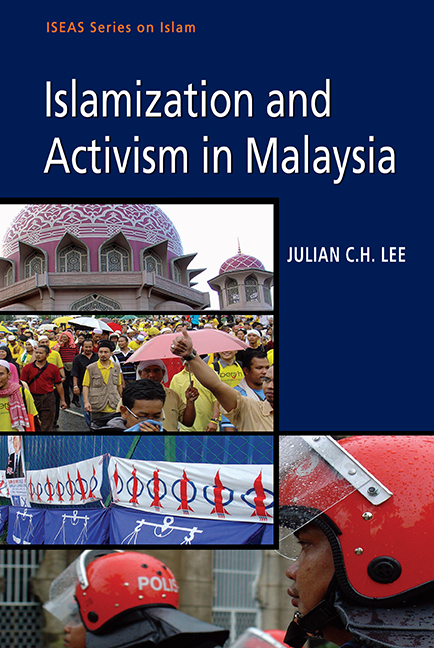Book contents
- Frontmatter
- Dedication
- Contents
- Acknowledgements
- Abbreviations
- Introduction
- 1 On Islam, Democracy, and Activism
- 2 A Short History of Malaysia
- 3 Malaysia as an Islamic State: The Debate
- 4 Conflict of Jurisdiction: Civil versus Syariah Law
- 5 Islamist Lawyers’ Views
- 6 Social Activism and the Article 11 Coalition
- 7 Questioning Orthodoxies, Criticizing Zealotry
- 8 Electoral Engagements
- Conclusion: Islam, Democracy, and Activism in Malaysia
- Bibliography
- Index
- About the Author
- Plate section
- Frontmatter
- Dedication
- Contents
- Acknowledgements
- Abbreviations
- Introduction
- 1 On Islam, Democracy, and Activism
- 2 A Short History of Malaysia
- 3 Malaysia as an Islamic State: The Debate
- 4 Conflict of Jurisdiction: Civil versus Syariah Law
- 5 Islamist Lawyers’ Views
- 6 Social Activism and the Article 11 Coalition
- 7 Questioning Orthodoxies, Criticizing Zealotry
- 8 Electoral Engagements
- Conclusion: Islam, Democracy, and Activism in Malaysia
- Bibliography
- Index
- About the Author
- Plate section
Summary
CIVIL SOCIETY, DEMOCRACY, AND THE PUBLIC SPHERE(S) IN MALAYSIA
This book is concerned with civil society's reactions to some of the negative impacts of political, legal, and social Islamization in Malaysia. I examine how different groups of people in Malaysia have sought to counter threats to the public domain and to their civil liberties as a result of authoritarianism, especially when it is linked to social, political, and legal Islamization. I examine the challenges that members of civil society face in engaging in their work in Malaysia and I also describe the various ways that activists seek to overcome the challenges they encounter. I try to illuminate the creative ways in which members of civil society both make use of existing public spaces and seek to create new spaces.
The scholarly interest in civil society outside the West is linked to the positive correlation that is perceived to exist between civil society and democracy. Democracy — and more specifically, liberal democracy — is now the normative form of government, and the extent to which States deviate from the ideal of liberal democracy is the extent to which they are frequently regarded by scholars and other governments as deficient. To the end of judging the state of democracy in a given country, the health of its civil society is often regarded as a key indicator. Civil society and democracy are often regarded as mutually supporting if not mutually causal.
What constitutes civil society is, however, difficult to pin down. There are contemporary and classical ideas about what civil society is. But as Salvador Gilner notes, there is even “no such thing as the classical conception of civil society” as there are, among others, the Lockean, Hegelian, Hobbesian, Marxian and Gramscian understandings of it (1995, p. 304).
Some, however, might call for caution in using “civil society” altogether in trying to understand subaltern or counter-hegemonic politics in Malaysia. Owing to the impreciseness of “civil society” even when confined to describing a European phenomenon, some authors have suggested that civil society is a concept that scholars should be all the more wary of when using in Asian contexts. Wayne Hudson notes that whereas “civil society” was a term that was developed after the phenomenon it described came into being in Western contexts, in Asia, that which it is supposed to denote is still developing (Hudson 2003, p. 15).
- Type
- Chapter
- Information
- Islamization and Activism in Malaysia , pp. 1 - 10Publisher: ISEAS–Yusof Ishak InstitutePrint publication year: 2010

